| Listing 1 - 6 of 6 |
Sort by
|
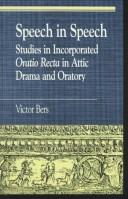
ISBN: 0847684490 0847684504 9780847684502 Year: 1997 Publisher: Lanham, MD : Rowman & Littlefield Publishing,
Abstract | Keywords | Export | Availability | Bookmark
 Loading...
Loading...Choose an application
- Reference Manager
- EndNote
- RefWorks (Direct export to RefWorks)
Greek drama --- Oratory, Ancient --- Greek language --- Speech in literature. --- Rhetoric, Ancient. --- Théâtre grec --- Eloquence antique --- Grec --- Parole dans la littérature --- Rhétorique ancienne --- History and criticism. --- Spoken Greek. --- Histoire et critique --- Grec parlé --- Speeches, addresses, etc., Greek --- Oral communication --- Oratory, Ancient. --- Théâtre grec --- Parole dans la littérature --- Rhétorique ancienne --- Grec parlé --- Greek drama - History and criticism. --- Speeches, addresses, etc., Greek - History and criticism. --- Greek language - Spoken Greek. --- Oral communication - Greece.
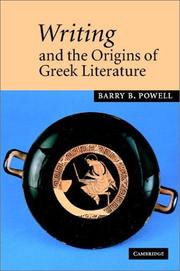
ISBN: 0521782066 9780521782067 Year: 2002 Publisher: Cambridge Cambridge University press
Abstract | Keywords | Export | Availability | Bookmark
 Loading...
Loading...Choose an application
- Reference Manager
- EndNote
- RefWorks (Direct export to RefWorks)
Greek literature --- Written communication --- Greek language --- Literacy --- Littérature grecque --- Communication écrite --- Grec (Langue) --- Alphabétisation --- History and criticism. --- History. --- Written Greek. --- Writing. --- Histoire et critique --- Histoire --- Grec parlé --- Ecriture --- History --- History and criticism --- Writing --- Written Greek --- -Greek language --- -Greek literature --- -Literacy --- -Written communication --- -Written discourse --- Written language --- Communication --- Discourse analysis --- Language and languages --- Visual communication --- Illiteracy --- Education --- General education --- Balkan literature --- Byzantine literature --- Classical literature --- Classical philology --- Greek philology --- Classical languages --- Indo-European languages --- -Writing --- Littérature grecque --- Communication écrite --- Alphabétisation --- Grec parlé --- Written discourse --- Greece --- Written communication - Greece - History --- Greek literature - History and criticism --- Literacy - Greece - History --- Greek language - Writing --- Greek language - Written Greek
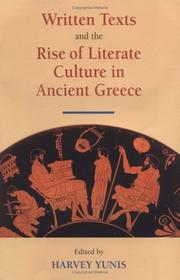
ISBN: 0521809304 0521039150 1107131855 0511179685 0511064063 0511306628 0511497806 1280415207 1139147595 0511057733 051107252X 9780511064067 9780511072529 9780511497803 9781280415203 9786610415205 661041520X 9781107131859 9780511179686 9781139147590 9780511057731 9780511306624 9780521039154 9780521809306 9780521039154 Year: 2003 Publisher: Cambridge, UK ; New York : Cambridge University Press,
Abstract | Keywords | Export | Availability | Bookmark
 Loading...
Loading...Choose an application
- Reference Manager
- EndNote
- RefWorks (Direct export to RefWorks)
From the sixth through the fourth centuries BCE, the landmark developments of Greek culture and the critical works of Greek thought and literature were accompanied by an explosive growth in the use of written texts. By the close of the classical period, a new culture of literacy and textuality had come into existence alongside the traditional practices of live oral discourse. New avenues for human activity and creativity arose in this period. The very creation of the 'classical' and the perennial use of Greece by later European civilizations as a source of knowledge and inspiration would not have taken place without the textual innovations of the classical period. This book considers how writing, reading and disseminating texts led to new ways of thinking and new forms of expression and behaviour. The individual chapters cover a range of phenomena, including poetry, science, religions, philosophy, history, law and learning.
Greek literature --- Written communication --- Language and culture --- Greek language --- Transmission of texts --- Literacy --- Littérature grecque --- Communication écrite --- Langage et culture --- Grec (Langue) --- Transmission de textes --- Alphabétisation --- History and criticism. --- History. --- Written Greek. --- Histoire et critique --- Histoire --- Grec parlé --- Greece --- Grèce --- Civilization. --- Civilisation --- History and criticism --- History --- Written Greek --- Civilization --- Arts and Humanities --- Culture and language --- Culture --- Written discourse --- Written language --- Communication --- Discourse analysis --- Language and languages --- Visual communication --- Illiteracy --- Education --- General education
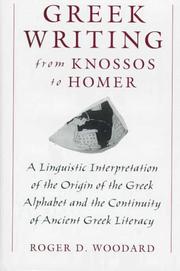
ISBN: 0195105206 0195355660 1280452722 0585381445 9780585381442 9786610452729 6610452725 9780195105209 0197704662 Year: 1997 Publisher: New York (N.Y.): Oxford university press
Abstract | Keywords | Export | Availability | Bookmark
 Loading...
Loading...Choose an application
- Reference Manager
- EndNote
- RefWorks (Direct export to RefWorks)
Woodard examines the origin of the Greek alphabet and treats the advent of its script as a point on an unbroken continuum of Greek literacy. He argues that those who adapted the Phoenician script were scribes used to writing with the script of Cyprus.
Greek language --- Written communication --- Language and culture --- Literacy --- Alphabet --- History. --- Written Greek. --- Writing. --- 003.341 --- 003.341 Grieks schrift --- Grieks schrift --- Grec (Langue) --- Communication écrite --- Langage et culture --- Alphabétisation --- History --- Written Greek --- Writing --- Histoire --- Grec parlé --- Ecriture --- Written discourse --- Written language --- Communication --- Discourse analysis --- Language and languages --- Visual communication --- Illiteracy --- Education --- General education --- Culture and language --- Culture --- Classical languages --- Indo-European languages --- Classical philology --- Greek philology --- Alphabet. --- Greek language - Alphabet --- Written communication - Greece - History. --- Language and culture - Greece - History. --- Greek language - Written Greek. --- Literacy - Greece - History. --- Greek language - Writing.

ISBN: 3261035617 Year: 1986 Volume: 32 Publisher: Bern Lang
Abstract | Keywords | Export | Availability | Bookmark
 Loading...
Loading...Choose an application
- Reference Manager
- EndNote
- RefWorks (Direct export to RefWorks)
Poetry --- Classical Greek language --- Comparative literature --- Civilization, Mycenaean --- Greek language --- Greek poetry --- Civilisation mycénienne --- Grec --- Grec (Langue) --- Poésie grecque --- Spoken Greek --- Dialects --- History and criticism --- Grec parlé --- Dialectes --- Histoire et critique --- Homer --- Language --- Mycenae (Extinct city) --- Mycènes (Ville ancienne) --- Civilization, Mycenaean, in literature --- Epic poetry, Greek --- -Greek language --- -Classical languages --- Indo-European languages --- Classical philology --- Greek philology --- Greek epic poetry --- Epic poetry, Classical --- Mycenaean influences --- -Homer --- -Knowledge --- -Language and languages --- Knowledge --- -Mycenae (Extinct city) --- -Mikínai (Extinct city) --- Mukenai (Extinct city) --- Mycena (Extinct city) --- Mycenae (Ancient city) --- Mycenes (Extinct city) --- Greece --- In literature --- Antiquities --- Civilization, Mycenaean, in literature. --- Mycenaean influences. --- Spoken Greek. --- Language and languages. --- Mycenae (Extinct city). --- In literature. --- -Mycenaean influences --- -In literature --- -Hóiméar --- Hūmīrūs --- Homeros --- Homerus --- Gomer --- Omir --- Omer --- Omero --- Ho-ma --- Homa --- Homérosz --- האמער --- הומירוס --- הומר --- הומרוס --- هومر --- هوميروس --- 荷马 --- Ὅμηρος --- Гамэр --- Hamėr --- Омир --- Homero --- 호메로스 --- Homerosŭ --- Homērs --- Homeras --- Хомер --- ホメーロス --- ホメロス --- Гомер --- Homeri --- Hema --- Pseudo-Homer --- Pseudo Omero --- -Greek epic poetry --- Homère --- Civilisation mycénienne --- Poésie grecque --- Grec parlé --- Mycènes (Ville ancienne) --- Classical languages --- Mikínai (Extinct city) --- Hóiméar --- Language.
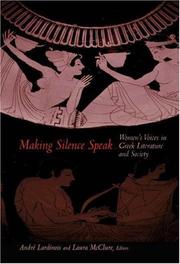
ISBN: 069100465X 0691004668 9780691004662 0691187592 Year: 2001 Publisher: Princeton Princeton University Press
Abstract | Keywords | Export | Availability | Bookmark
 Loading...
Loading...Choose an application
- Reference Manager
- EndNote
- RefWorks (Direct export to RefWorks)
This collection attempts to recover the voices of women in antiquity from a variety of perspectives: how they spoke, where they could be heard, and how their speech was adopted in literature and public discourse. Rather than confirming the old model of binary oppositions in which women's speech was viewed as insignificant and subordinate to male discourse, these essays reveal a dynamic and potentially explosive interrelation between women's speech and the realm of literary production, religion, and oratory. The contributors use a variety of methodologies to mine a diverse array of sources, from Homeric epic to fictional letters of the second sophistic period and from actual letters written by women in Hellenistic Egypt to the poetry of Sappho. Throughout, the term "voice" is used in its broadest definition. It includes not only the few remaining genuine women's voices but also the ways in which male authors render women's speech and the social assumptions such representations reflect and reinforce. These essays therefore explore how fictional female voices can serve to negotiate complex social, epistemological, and aesthetic issues. The contributors include Josine Blok, Raffaella Cribiore, Michael Gagarin, Mark Griffith, André Lardinois, Richard Martin, Lisa Maurizio, Laura McClure, D. M. O'Higgins, Patricia Rosenmeyer, Marilyn Skinner, Eva Stehle, and Nancy Worman.
Greek literature --- Women and literature --- Women --- Greek language --- Speech in literature. --- Women in literature. --- Littérature grecque --- Femmes et littérature --- Femmes --- Grec --- Parole dans la littérature --- Femmes dans la littérature --- History and criticism. --- Women authors --- History and criticism --- Social conditions. --- Spoken Greek. --- Histoire et critique --- Femmes écrivains --- Conditions sociales --- Grec parlé --- Intellectual life. --- Littérature grecque --- Femmes et littérature --- Parole dans la littérature --- Femmes dans la littérature --- Femmes écrivains --- Grec parlé --- Poetry --- Fiction --- Thematology --- Sociology of the family. Sociology of sexuality --- Antiquity --- Speech in literature --- Women in literature --- Human females --- Wimmin --- Woman --- Womon --- Womyn --- Females --- Human beings --- Femininity --- Woman (Christian theology) in literature --- Women in drama --- Women in poetry --- Balkan literature --- Byzantine literature --- Classical literature --- Classical philology --- Greek philology --- Classical languages --- Indo-European languages --- Spoken Greek --- Women authors&delete& --- Intellectual life --- Social conditions --- Sappho of Lesbos --- Greek literature - History and criticism. --- Women and literature - Greece. --- Greek literature - Women authors - History and criticism. --- Women - Greece - Intellectual life. --- Women - Greece - Social conditions. --- Greek language - Spoken Greek. --- Dans la littérature --- Histoire --- Grèce --- Literature --- Writers --- Images of women --- Book --- Dans la littérature --- Grèce
| Listing 1 - 6 of 6 |
Sort by
|

 Search
Search Feedback
Feedback About UniCat
About UniCat  Help
Help News
News